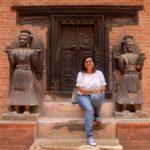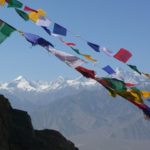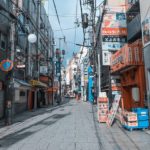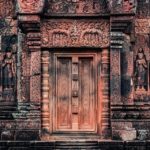A Guide to the Peace Corps: A Conversation with Kelly Branyik
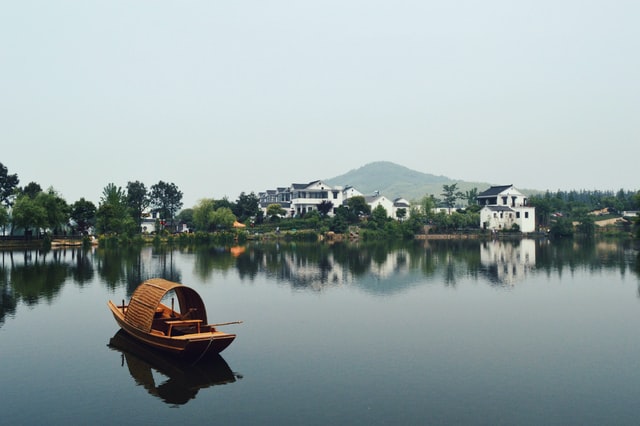
The Peace Corps is a volunteer program run by the Government of the United States. For anyone who has considered joining, or who has volunteered with the Peace Corps, the term “it depends” will surely resonate. Peace Corps Volunteers (PCV) completing two years of service could be placed in a congested city, in the middle of a desert or in a small beach town. They could teach English to adults or help launch a community radio or social enterprise bakery. Simply put: “it depends.”
Kelly Branyik, former PCV in China and author of It Depends: A Guide to Peace Corps, plays with this idea in her guide. Volunteers know the goals of the Peace Corps–to assist in technical training and to promote cross-cultural understanding–and where they’ll be going. But the nitty-gritty of day-to-day living and working is less clear. For Branyik, no amount of research could have prepared her for the culture shock, confusion and emotions she would feel while serving. But, in her debut book, Branyik reminds us that while it depends, there’s a lot you can still prepare for.
Sharing insight from her two-year volunteer stint, Branyik guides the reader through each step in the application process, in-country service and post-service on what to expect. In an encouraging and informational tone, readers learn why it’s important to be honest on the Health History Form (HHF), what happens when a language barrier is too big to handle, what it’s like to realize you’ve been insensitive to other cultures, and more. It Depends: A Guide to Peace Corps is a great addition to the literature on volunteering abroad. It offers firsthand advice from former PCVs and a step-by-step guide from start to finish.
Now back in the United States, Branyik works in advertising and runs the blog Travel Branyik. We spoke to her about what inspired her to write the book, traveling in China, and her advice to future PCVs.
First, congratulations on finishing your Peace Corps service and publishing your debut book. Would you share with Pink Pangea what inspired you to write and publish this guide? Why is it important for applicants to have a guide during the process?
The reason I was inspired to write this book was because I had a service I was not prepared for.
Most of us aren’t truly prepared for service because the descriptions of what we are doing can be vague, and honestly, it depends on where you go and what you’re doing. I was the first volunteer at my school and the first foreign teacher ever within my school. I hadn’t even considered that this would be a possibility, and it was very difficult for me.
Eventually, I overcame the hardships and came out with a successful service, but more than anything I wanted to help people prepare and make the whole process from application to close of service easier for the next applicant. There is a lot in this book that touches on how to cope with situations that would otherwise give you anxiety, make you angry or uncomfortable. That’s why I think it’s important people read it.
In the book, you talk a lot about your personal transformation. What was the most striking way Peace Corps changed you, and how did you cope with it? Why is it important future PCVs are prepared for something like this?
The flight or fight moments often happened in China, and I was challenged daily on my perspectives and belief systems because the culture was so drastically different from my own. My first term as a volunteer was the hardest one because my students didn’t speak English and I couldn’t speak Chinese. I struggled with what I was even doing, and I didn’t think I was strong enough.
In my desperation to feel better about everything I was going through, I wanted to find a healthy way to cope with the stress. So I joined a gym. Seems like such a regular thing, but the day I joined that gym was the day I decided to start taking better care of my physical, mental, and spiritual health, which ultimately made my life in China SO much easier.
The gym became the center of my personal growth because of the support group I developed there amongst the coaches. They loved seeing a strong woman, and loved when I competed with them. They built me up. They practiced Chinese with me, and they were there for me when I was having my most stressful days.
Being in Peace Corps made me a stronger and better person, and that’s why I encourage everyone to do it or at least consider it.
If there was one moment you could relive during your service, what would it be?
One of my favorite moments during my service was getting to share my physical transformation on television. After years of being overweight, I lost 50 pounds while living in China, which you can understand made me feel unstoppable. They had me be a part of a 30-minute segment and followed me around for two days capturing shots of my daily life as a foreigner in China making this incredible change. I wasn’t able to talk too much about my Peace Corps goal on camera, but I wish I could’ve talked about it a lot more. It was fun getting to tell my story.
In the book, you also mention your upbringing–as well-meaning as it was–wasn’t conducive to fully understanding the diversity of the world. How has being a PCV inspired you to change that environment? How do you respond differently to lack of diversity now?
Being a PCV exposed me to one of the most diverse groups I’ve ever encountered. I adore every single one of my China group members. Words can’t express how much I love and appreciate them for sharing their stories.
I think my biggest challenge was thinking China had to be a certain way because that’s how it was in America. I used to get so upset about what I couldn’t control. After a while, it was so tiring feeling that way and the more I got to meet people and know their lives, the more I started to love the culture and people. Sure, these people were Chinese, but they are no different than Americans. They want the same things. To be loved, to be happy, to have a good home and security. We’re all the same.
These days, I am a lot more sensitive to the feelings of others and have taken my stance on how people treat one another, especially those of different skin color or sexual orientation. I think I love people in ways I never would’ve before had I not been in Peace Corps and challenged in that way.
A Guide to the Peace Corps: A Conversation with Kelly Branyik.
Now, I’d like to ask you about the Peace Corps. For Pink Pangea readers interested in joining, what’s the most important takeaway from your book?
I think the most important takeaway from this book is that Peace Corps is a decision that will bring you so many unbelievable positives should you choose to take the plunge. Peace Corps is everything it’s chalked up to be; it’s difficult, enlightening, empowering, and an overall positive and life-changing experience that opens so many doors to you. It’s important to take a path like this to get out of our comfort zones, get to know others, learn other cultures, and start to understand that we are all in this world together and we should be kinder to one another. Our goal as Peace Corps volunteers is to learn from them and vice versa.
What advice do you have for future PCV about studying their destination before departure?
I studied like hell for China and didn’t sleep the week after I received my invitation to serve in China. I made a list of the 22 places I wanted to see, not knowing that some of those places would be out of reach because of where I would end up serving. We also didn’t know where we were living until two months after being in-country.
I also think a lot of what we see on the news can be extremely negative to our perception of another culture, which can influence us to back out. People have so many bad things to say about China, but I can tell you first hand, people in China are some of the nicest people you will ever meet and I never felt unsafe going out at 2 am to eat a bowl of noodles. A lot of what people said about China just wasn’t true.
People are always going to have their opinions of a different country, positive and negative, and that won’t change. In the end, it will be your choice on how you want your service to be. My advice to you is to be open-minded and let it all wash over you.
Let’s talk about travel during service, because Pink Pangea readers are all about travel! You had two days off for every month. Tell us about one of your most memorable trips.
I saved up a lot of my time to take lengthier trips around the country, but one of my favorite trips of all time was the last one I took during the Chinese Lunar New Year in 2016, which lasted about two weeks. I left our mandatory Peace Corps training, which happens in Chengdu, Sichuan, at our headquarters, and then took a train to Zigong, Sichuan to see the Colored Lantern Park (one of the places on my list). I was there two days and drank some of the most famous tea in that city.
My next destination was to Xi’an to see the Terracotta Warriors and climb Hua Shan. I took a train to Chongqing’s North Railway station, made a transfer within 10 minutes and hopped on the next train just in time to ride the rails to Xi’an. An 11-hour train ride. When I stepped off the train 11 hours later, I walked two blocks to my capsule hotel, which resembled a spaceship. The next day, I got up early to get on a bus to see the Terracotta Warriors. After I came back, I decided to walk five miles to see the Wild Goose Pagoda and another five miles back to the hostel. I found a local noodle spot and ate there pretty much every day.
The next day, I got up even earlier and got another bus that would take me an hour to Hua Shan, which was a mountain in Xi’an. It was February, so it was cold, but I decided to climb the mountain anyways. There was barely anyone, and it took me about three and a half hours to make it to the top. The paths were steep and some places you had to hold onto chains. There were times I looked back and was in tears because I was so glad this was what I was doing, and where I was. When I reached the top, I was so proud of myself and my strength. People talk about climbing mountains but rarely follow through. And I did it, and by myself.
From Xi’an, I took a trip up north to Handan to see a friend of mine. He was part of a traditional family, and so I was able to celebrate an authentic Chinese Lunar New Year with all the traditions, the food offerings, burning paper money, and praying to their gods. It was the most unforgettable experience of my life.
Finally, I’d like to ask about publishing. Would you share with readers a bit about the book writing and publishing process? What was your experience like?
I published through Write With Light Publications LLC, which is a publishing company that focuses on publishing work that is inspiring, uplifting, and encourages people to shine their ‘light.’ I could’ve easily chosen to publish through Peace Corps, but I wanted to be a part of a publication that was geared toward inspiring the divine within each one of us.
My cover was created by my good friend and fellow Peace Corps China member, Colton Davies – a very talented graphic designer. The publishing process was really easy and working with WWL was effortless. They took their time editing, and they were very thorough with their suggestions for developing the story. It was helpful getting a few pairs of non-Peace Corps eyes on it to make sure everything I was saying was understandable. They were fantastic.
We plan to update this book every year, or few years, to keep up with the trends of Peace Corps and make sure volunteers have the most up to date information.
As for writing the book, I started this idea shortly after returning from Peace Corps last year. I was still grieving my separation from China, so I think it was difficult for me to process everything I had there up until a few months ago when I decided it was time the project was finished.
I originally had a massive amount if chapters and cut six or seven of them. It was a long process trying to pinpoint what should be known and what should be taken out. Overall, I am incredibly satisfied with this book and how it turned out, and I can’t wait to do the next version.
I’m publishing my next book through WWL as well, which is a more detailed story of my experience. It’s called “Wintersweet” and will come out next year.
Photo for A Guide to the Peace Corps: A Conversation with Kelly Branyik by Unsplash.

